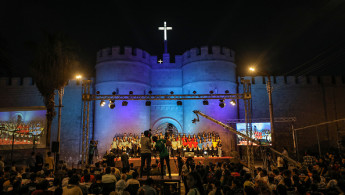Amid blackouts, Egypt's churches open doors for all students before final exams
Several Coptic Orthodox churches in Egypt have in recent days opened air-conditioned halls, amid electricity blackouts, hosting secondary school students and offering them free internet connection, coffee, tea and cold water as they studied for this year's final exams.
The move is believed to have first been jointly initiated by seven Coptic Orthodox Churches in the Mediterranean City of Alexandria, followed by others in the capital, Cairo, and elsewhere in the country, urging pupils, regardless of religious affiliations, to take refuge inside these places of worship that have power generators running during power cuts until tests end on 17 July.
Recent unexpected blackouts had coincided with an unforgiving heatwave and during final exams for Egyptian students of "Thanaweya Amma" (the last secondary school year prior to college), sparking outrage among parents nationwide, who viewed the government as failing their children.
No accurate percentage of Christians in Muslim-majority Egypt has ever been officially released. But it is believed they make up approximately 10 to 15 percent of the nearly 109 million population; most are Coptic Orthodox, among the world's oldest Christian communities.
With temperatures ranging from 40 to 50 degrees Celsius, electrical overloads have now added to Egyptian woes, especially in the south known for its extremely hot weather.
Meanwhile, mosques and owners of coffee shops and event halls across Egypt, where power generators were available, followed the Coptic churches' lead, offering similar services to the country’s distressed students.
Even though the Egyptian government had earlier declared a schedule for planned power cuts lasting up to a maximum of three hours daily to alleviate electrical overloads, sudden blackouts have been reported, lasting for as long as 12 hours in some parts of the country, including Cairo.
On Tuesday, Egypt's Prime Minister Mostafa Madbouly vowed to end the ongoing nationwide power crisis that triggered widespread discontent towards his government.
During a televised press conference, Madoubly apologised to the Egyptian people for the sustained inconveniences, saying that the country would import petroleum products used for power generation worth about US$ 1.8 billion in a bid to end the ongoing ordeal by the end of this year.
Earlier this month, old posts on President Abdel Fattah al-Sisi's achievements were reportedly removed after growing criticism by activists and citizens over unfulfilled vows, including an end to power cuts.
Some of the posts date back to 2014 after Sisi assumed his post, taking pride in how his government managed to end frequent power cuts, one of the reasons igniting citizens' outrage towards the rule of late President Mohamed Morsi, who was subsequently overthrown by the then-defence minister Sisi in 2013.





 Follow the Middle East's top stories in English at The New Arab on Google News
Follow the Middle East's top stories in English at The New Arab on Google News


